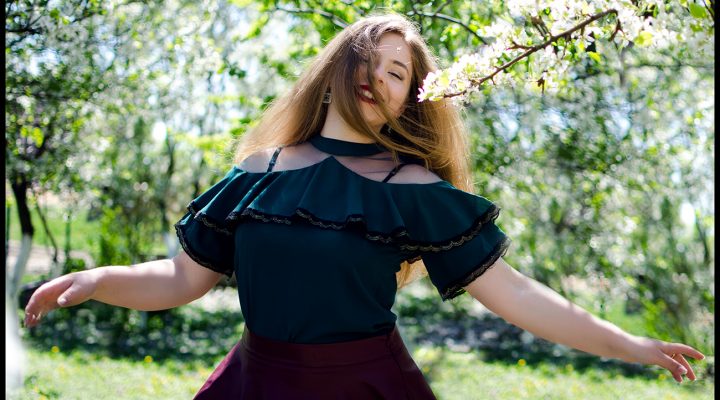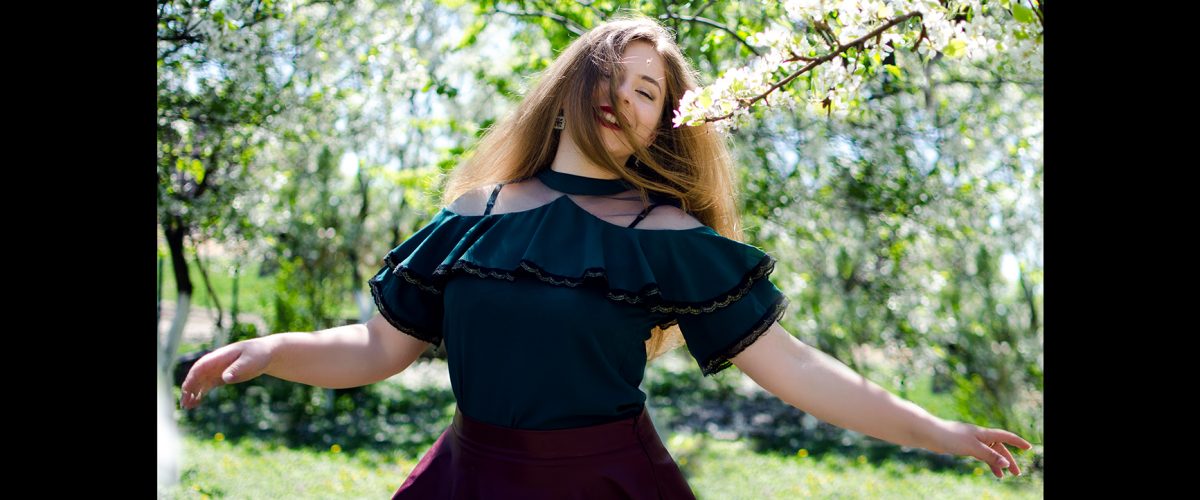A childhood friend and I recently have been talking a lot about our bodies. With both of us on the edge of turning 40, what society says about who we are supposed to be or how we are supposed to look is discouraging at best.
Both this friend and I were raised in an ultra-conservative environment that taught us it was our responsibility to dress modestly in order to keep boys from lusting. If our shorts were too short or our necklines too low, then any unwanted attention that came our way was our fault.

Amber Wylde
I don’t know that I ever remember feeling stylish or fashionable growing up. We were those homeschooled kids with ankle-length homemade jumper dresses complete with ruffles and petticoats. Sigh.
I remember a time as a teenager when I tried on a black dress for an event and felt amazing! My mom’s response to it was that it looked “too good.” Rather than allowing me to lean into feeling good about how my body looked as an insecure teen, she made me put it back, afraid of the temptations it could bring.
Messages, both subtle and overt, taught us as women to be ashamed of our bodies and therefore ashamed of our selves — that who we are at our core needed to be hidden. To say it is difficult to undo this programming as an adult in a society that capitalizes on appearance and body image is an understatement.
“Messages, both subtle and overt, taught us as women to be ashamed of our bodies and therefore ashamed of our selves.”
My childhood friend and I have tried intentionally to push back against that. A recent example is our exploration of crop tops — something strictly forbidden growing up. Even as an adult, I’d never worn them because I believed they were an item designed only for the skinny girls, a group where I did not belong. My friend never had worn them because she believed they were only for young and hip girls — and she’s a mom of two pushing 40.
But then we decided to push back on those beliefs. I bought some to wear around the house — feeling that was a safe start since I live alone. She bought some because she lives in Florida where the heat is sweltering for months. Sending pictures back and forth as we both battle ingrained messages that we want desperately to be rid of, we’ve both been surprised at how liberating it has been. In fact, we’ve encouraged each other along the way and are leaning into wearing them more rather than letting society dictate what we can and cannot wear depending on our size and age.
Both of us have had breakthroughs as we’ve push back on the conditioning of our youth and allowed ourselves to feel or wear something that society (or religion) said was not meant for us. Both of us desire to break the cycle of body shaming and love our bodies as they are.
This friend had a mother who told her two extremes — either she was too fat and needed to lose weight so people didn’t think she was pregnant, or she was too skinny and needed to gain weight so people didn’t think she was anorexic. Neither of these things were true. She was a perfectly healthy size and weight for her age. My friend does not want to pass these same messages of body shaming onto her daughter.
Even though I do not have a daughter, I have and am continuing to work hard to love my body as it is. That’s proved challenging as one who lives with multiple chronic illnesses in a body that often feels like it’s betraying me and is very much out of my control.
I recently pushed myself to do a photoshoot, even though I’ve been uncomfortable in my body, simply to lean more into this act of self-love. The photos came back. I did not love them. At first glance, all I saw was the fatigue in my tired eyes, the weight I had put on from all the illness and trauma of the last few years, and how swollen and puffy my hands had become from my most recent diagnosis.
Then a voice inside stopped me. It was not a voice of criticism. It was a voice of compassion.
“Stop. Look at this body. Look at it and love her. Just love her.”
“Tears welled in my eyes as I saw past the obvious and into the real.”
Tears welled in my eyes as I saw past the obvious and into the real — the illness, the trauma, the physical and emotional pain, the medication regimens, the fatigue, but also the strength, the healing and the resistance.
Loving ourselves and our bodies is not only setting ourselves free from society’s standards, it’s an act of resistance against a world that tells us who we are is not enough. Not thin enough. Not light enough. Not dark enough. Not muscular enough. Not soft enough. Not pretty enough. Not young enough. Never enough.
Albert Camus says, “The only way to deal with an unfree world is to become so absolutely free that your very existence is an act of rebellion.”
How sad that we live in a world where simply loving the body we’ve been born into is a rebellious act. Yet what an opportunity to do something differently.
What if instead of buying into capitalistic society, we lean into a nurturing one?
What if instead of being controlled by insecurity, we lean into the freedom we each deserve?
What if instead of degrading our bodies, we gently love the bodies we’ve been given and offer them gratitude each day?
What if doing these things creates a domino effect that gives other people permission to do the same?
What if by simply loving ourselves, we start a self-love revolution?
What if?
Amber Wylde is a national speaker, community healer and the author of three books. Her newest book, Out of Focus: My Story of Sexuality, Shame and Toxic Evangelicalism, releases October 2023. As a gay woman living with the invisible disability of both Lyme disease and rheumatoid arthritis, Amber specializes in bringing messages of diversity, hope and self-acceptance to those who have been pushed to the margins. She is host of the Unashamed Love Collective — a safe haven for LGBTQ people and allies that fosters supportive community. She also leads Cultivating Community Retreats — small, intimate group gatherings that build lasting relationships with like-minded people. Learn more at Patreon.com/AmberCantornaWylde, on social media @AmberCantornaWylde or online at AmberCantornaWylde.com.
Related articles:
3 ways to practice embodiment in a country that is censoring and capitalizing on our bodies | Opinion by Amber Wylde
Naked and ashamed: American Christianity’s purity culture and embodiment in the church | Opinion by Alice Fry
A pastoral dilemma about art and nudity: embodied faith and raising children in the church | Opinion by Mark Wingfield


